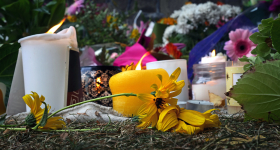Alison Roh Park was 14 the first time she saw a man masturbating across from her on the subway. Another time, a group of drunk white men obstructed her path outside a bar and asked for a massage. “Men will explicitly refer to me as ‘China Doll,’ ‘Dragon Lady,’ ‘Chinita,’ ‘Miss Chin,’ even ‘Sushi!’ ” says Park, a 29-year-old Korean American activist from Queens, NY, who is part of a growing movement against street harassment. Thanks to the proliferation of smartphones and GPS technology, she and women around the globe are finding new ways of speaking up and talking back.
Holla Back DC! (hollabackdc.wordpress.com) is a regional crowd-sourced blog that is part of an international network of websites aiming to bring attention to street harassment via mobile technology, including cellphone photos, maps locating harassment in real time and video of perpetrators in action.
The Hollaback movement was started in 2005 in New York City, but chapters now exist everywhere from Argentina to Croatia, and Israel to India. Chai Shenoy and Shannon Lynberg founded the DC blog in 2009, “simply as an online platform where people could talk about something so systemic and pervasive,” Shenoy said.
The DC site posts about experiences ranging from uncomfortable
glances to public masturbation and being followed home. According
to Shenoy, many of the women feel powerless to respond
immediately to the harassment or are too stunned to speak up before
the moment has passed. Even in the moment, “a comment or
reaction can escalate the attention and sometimes lead to actual assault,
or in some
circumstances,
murder,” she
said. “It can be
very healing to
have outlets to
talk about it.”
The site has
posted several instances in which the victim of street harassment,
an accompanying partner or helpful bystander fought back and was
killed by the aggressor.
In the case of repeated harassment, as street harassment often
is, emotional distress can build up, according to Miriam Yeung,
executive director of the National Asian Pacific American Women’s
Forum. “It’s a totally normal human reaction to start to wonder if
you’ve done something wrong, or if you somehow deserve this attention or are inadvertently asking for it,” Yeung said. “When we
start talking, we find that our stories are actually not unique — all
women have encountered harassment. We aren’t bad individuals
but rather we live in a society that permits this treatment of women.”
For Asian American and Pacific Islander women, talking about
these experiences online can be particularly liberating, said Shenoy,
who is of South Asian descent. “API gender-based violence isn’t
talked about a lot,” she said, because of cultural guilt and shame.
“Plus, there is an API cultural norm of not talking about sex with elders.
So if sexual assault happens — these are tough conversations
to have with parents or siblings. So some just don’t.”
For immigrant communities, there are often language barriers,
confidentiality concerns and fear of the law when it comes
to coming forward about harassment. However, Shenoy believes
even fewer resources exist for those who straddle both American
and Asian communities and face unique challenges: “How do you
educate people who grew up with Asian culture but also American
values?”
Immigrant parents often do not know what it is like to grow up
as a racial minority and can’t fully relate to the racism that their
children grow up with in the United States, Yeung said. Mainstream
youth-serving organizations and after-school programs often aren’t
culturally competent, Yeung said, particularly with Asian cultures.
API women in particular are often targeted with verbal harassment
in a combination of stereotypical racism and sexism. “Asian
American women are told they work in massage parlors or are sex
workers,” Shenoy said. “They are demoralized and don’t know what
to do.” Also common are comments that commodify and objectify
the bodies of women of color as “exotic.”
Park views all of her experiences with misogyny and sexism as
racialized ones. “As a girl, (these experiences) taught me that anyone
has the right to obstruct my public space, comment on my body,
clothes or appearance, and that those were my value,” she said.
The Hollaback movement is working hard to change this reality
for women and LGBT individuals, as well as the wider perception
that street harassment is a small issue, a mere annoyance. “It’s important
to take a stance on something that may feel so small in the
grand scheme of things,” said Shenoy, who is also a staff attorney
at WEAVE (Women Empowered Against Violence) representing sexual
assault survivors. “If we don’t speak up about our safety walking
down the street or taking the Metro, then we allow others to take
that space away from us. We need to reclaim space.”
Technology has opened the door for progress in that goal, providing
“the ability to break down barriers and share experiences, to
address gender-based violence by sending a mass text,” Shenoy
said. Technology gives people what she calls a “voice of agency”
to “holler back,” or vocalize a response, in the face of harassment.
“Part of ‘hollering back’ is to find empowerment in a situation that
can feel like someone took away your dignity.”
The DC group hopes to grow offline and has held workshops
and outreach events as well as partnered with local self-defense
organizations. They also recently performed a community audit,
asking people on the street about when and where they feel safest
in public.
This August, Shenoy launched Collective Action for Safe Spaces
(collectiveactiondc.org), an umbrella organization against public
sexual harassment that includes the Holla Back DC! blog and Right-
Rides, a service set to launch next year offering free late-night rides
home for women and LGBT individuals from volunteers driving a
fleet of donated Zipcars.
Yeung is encouraged by the movement’s growth. “In this environment,
it’s hard enough for young Asian American women to find
their own authentic sexuality,” Yeung said. “Having people put their
stuff on you, literally and figuratively, while you’re just going about
your life makes it all the more difficult.”
And it gives ladies all the more reason to holla back.
Nicole Wong is a contributing editor at Hyphen.









Comments